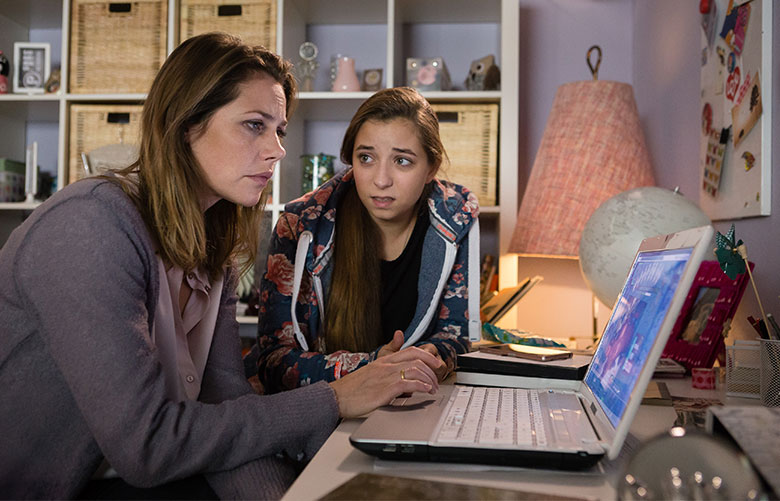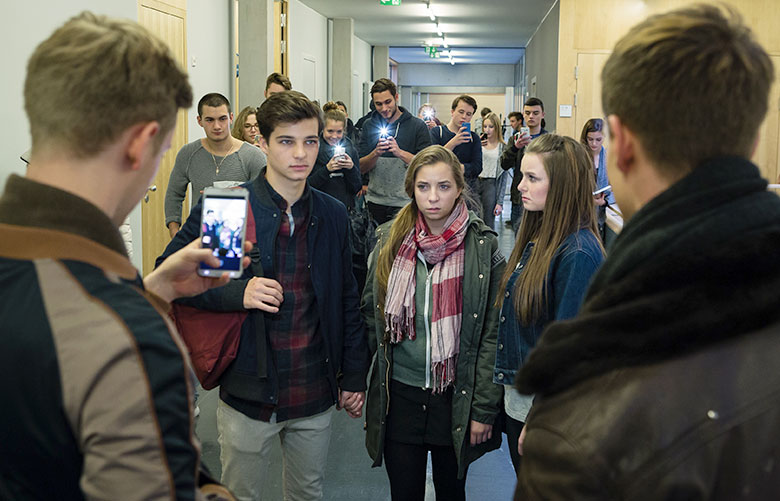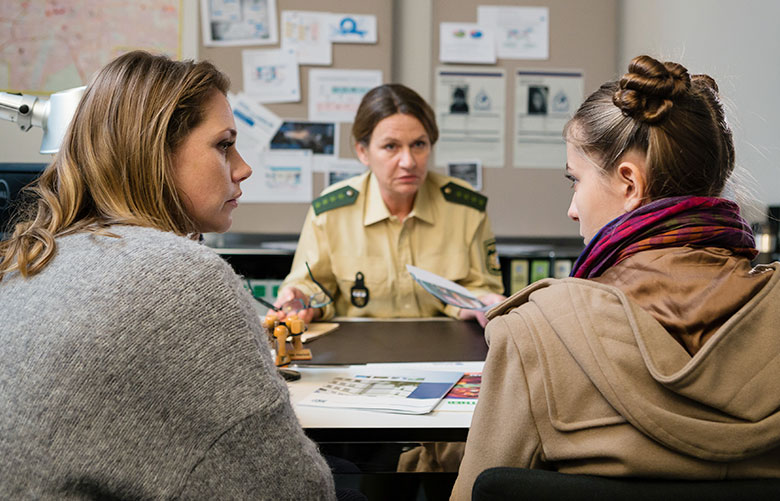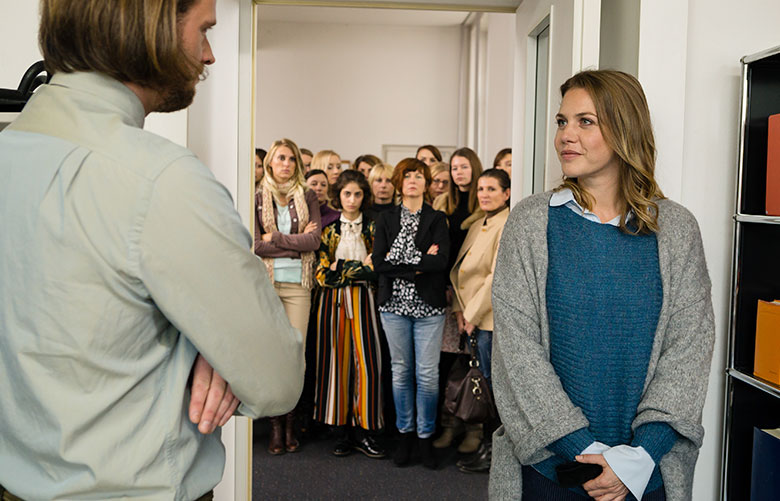Online Harassment
The anonymity of the Internet lowers the inhibitions that would normally prevent bullying. Without timely intervention, the consequences for the victims can be devastating. SAT.1 is raising public awareness for this pervasive problem with the TV movie Nackt. Das Netz vergisst nie. while also underscoring the station’s long-term social engagement.
Virtual confessionals on the photo-sharing platform Instagram are a hot trend among students in German schools. But you won’t find religious images under the hashtag #beichten (“confessions”); they have nothing to do with sin, guilt, or repenting. Here, students post “revelations” that often refer to classmates or teachers. “The content of the confessions ranges from harmless jokes to personal insults and accusations tagging people by name,” says Günter Steppich, a teacher and youth media-protection adviser at the Wiesbaden school board. His digital tally for the week: four cases of cyberbullying in the form of Instagram confessions, two of which resulted in libel charges. The cases stand a good chance of being solved. “Most operators of these confessional pages don’t realize that they are by no means anonymous on Instagram,” Steppich says.
Things are rough at many German schools. Psychological and physical abuse are often the order of the day, according to the recently published special volume of the 2015 PISA study on students’ well-being throughout the world. In Germany, nearly one in six 15-year-olds experiences bullying on a regular basis at school. And that’s not the only place. In this era of social media such as WhatsApp, Snapchat, Twitter, and others, insults, threats, humiliation, and isolation have spread far beyond the classroom and schoolyard. Even in elementary schools, WhatsApp groups are set up with names like “Class 4b except Laura.”
According to the most recent JIM study on youth, information, and multimedia by the Media Education Research Association South-West, 95 percent of all young people between the ages of 12 and 19 use the messenger service almost daily. Instagram, used several times a week by over half of all teens, ranks second among online activities. When asked if they themselves had experienced bullying on their phones or the Internet, some eight percent answered “yes.” That proportion rises to 13 percent for older teens. “These days, bullying virtually always has a cyber component, which makes the humiliation more effective and even worse for the victims,” says Birgit Kimmel, head of education at the EU initiative Klicksafe, which works to make the Internet safer.
With “traditional” bullying, awareness of each incident is limited to a certain number of people; now, practically anyone can be involved and watch victims experience massive attacks around the clock. There is no escape. And attempting to stop the onslaught is like fighting windmills, as the SAT.1 drama Nackt. Das Netz vergisst nie. (Naked. The Net Never Forgets.) powerfully illustrates.
“Serves you right, how could you be so naive and careless?” That’s often the initial reaction, especially when the bullying involves nude photos. “At first, these pictures are a sign of love and trust, and then …,” is sexting victim Amal’s description in the SAT.1 movie. Once they’re in circulation, whether motivated by revenge, jealousy, or adolescent power plays, they trigger a cycle of suffering that runs the gamut from shame, fear, and self-doubt, all the way to suicidal thoughts. The victims, usually girls and women, can’t count on much empathy. That’s because in cyberbullying – far more than the traditional variety – onlookers and malicious accomplices are part of the system.
Cyberbullying has become a serious problem in our society.
Kaspar Pflüger, Managing Director of SAT.1Getting help and informing parents, teachers, or school administrators is not an easy step. “Many try to weather the storm alone. The public nature of the insults is an incredible burden the people affected have to bear. The fear is overwhelming,” says Nina Pirk, a specialized counselor at the umbrella organization of the "Nummer gegen Kummer" helpline, which has been offering children and teens free, anonymous counseling for over 30 years.
#AugenAUF

Insults, hurtful comments, and embarrassing pictures have no business online – that’s the clear message sent by the theme day SAT.1 set up in April 2017 to raise awareness for the issue of cyberbullying. The TV and online campaign #AugenAUF (eyes open) was implemented in cooperation with the EU initiative klicksafe.de along with TV and Internet celebrities, and publicized on the station’s own platforms as well as the spokespeople’s Facebook and YouTube channels. [M7]
The adult universe in your back pocket
Many people lack any sense of wrongdoing when they click “Share” or “Like.” “We hear the excuse that it was ‘just a joke’ all too often. But that is neither moral or legal justification,” says Stefan Middendorf, the media expert responsible for prevention at the State Office of Criminal Investigation in Stuttgart. The legal situation is clear: Cyberbullying can be prosecuted under various articles in the criminal code and copyright law. Victims are going to the police more often. “Charges are being pressed in far more cases,” Middendorf says.
To stop things before they get that far, prevention is called for. “Broad-scale education is the key to preventing cyberbullying,” youth media-protection expert Steppich says. But teachers, school social workers, and guidance counselors trained to provide that are scarce. And unlike the Netherlands, for example, where all schools have been required by law since 2015 to implement long-term preventive measures, German schools can choose whether or not to take action. It’s also up to parents, however, to get more involved with the online worlds their children live in. “Many parents still don’t realize that a smartphone isn’t a simple cell phone,” Steppich says. “Putting the entire adult universe into young children’s back pockets is not such a good idea.”
500,000 teens
Asked whether they themselves had been affected by bullying, eight percent of young people aged 12 to 19 answered “yes.” That is equal to about 500,000 teens in Germany.1
34 percent
In the 12- to 19-year-old age group, one in three (34 percent) claims to know someone who has been bullied, either online or by phone.1
1 Source: Media Education Research Association South-West, 2016 JIM Study
Nackt. Das Netz vergisst nie.
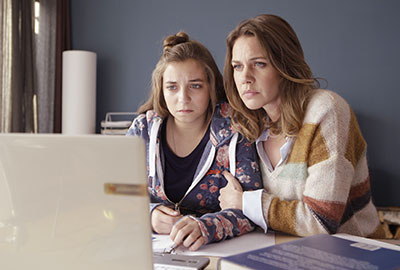
When a nude photo of her 16-year-old daughter Lara appears on the Internet and there is an attempt to blackmail the family, Lara’s mother Charlotte (Felicitas Woll) wants justice. Yet the harder she fights the blackmailer in the SAT.1 drama Nackt. Das Netz vergisst nie., the more intensely she experiences the net’s overwhelming power. Simply going offline, trying to “quit looking at that garbage all the time,” as Marcus (Martin Gruber), the father in the movie, advises his shocked daughter (Aleen Kötter) is not the answer. At school, Lara suffers from her classmates’ derision and malice; ultimately, even her friends turn their backs on her. The police are just as powerless. “There are no beat cops on the Internet,” an officer tells Charlotte.
The SAT.1 movie is based on the true story of Canadian high-school student Amanda Todd, one of 39 victims blackmailed with nude photos for years by a 38-year-old Dutch man who has since been convicted, and who took her life in 2012 at the age of 15. It explores the apparently hopeless battle fought by a mother along with other victims, prosecutors, and Internet experts to stop the perpetrator. They succeed in shutting down the website – but it’s a Pyrrhic victory, as one of the people involved is unable to bear her psychological scars and commits suicide.
“As a major TV station, we also want our programs to raise our viewers’ awareness of issues like these,” says SAT.1 Managing Director Kaspar Pflüger of the motivation for this engagement, which reached some 2.62 million viewers (ages three and up; market share: 11.2 percent among 14–49 year-olds). Nackt. Das Netz vergisst nie. (Naked. The Net Never Forgets.) is already the third theme-based film that illustrates the station’s long-term social engagement. The drama Die Ungehorsame (The Disobedient Woman) about domestic violence was watched by an audience of some 3.58 million (ages three and up; market share: 12.8 percent among 14–49 year-olds) in 2015. The movie garnered numerous awards, including the 3sat Audience Award for its authentic portrayal of the topic. In 2016, the organ donation drama Zwei Leben. Eine Hoffnung. (Two Lives. One Hope.) attracted 2.28 million viewers (ages three and up; market share: 9.2 percent among 14–49 year-olds). ProSiebenSat.1 leverages its expertise as an entertainment company to charge difficult issues with emotion and make them accessible to a broad audience. [M7]
Producers: Christian Becker, Martin Zimmermann Director: Jan Martin Scharf
http://www.sat1.de/film/der-sat-1-filmfilm/nackt-das-netz-vergisst-nie
»BE CAUTIOUS WITH INFORMATION«
Interview with Pascal Raddatz, Cybersecurity Analyst, ProSiebenSat.1 Media SE
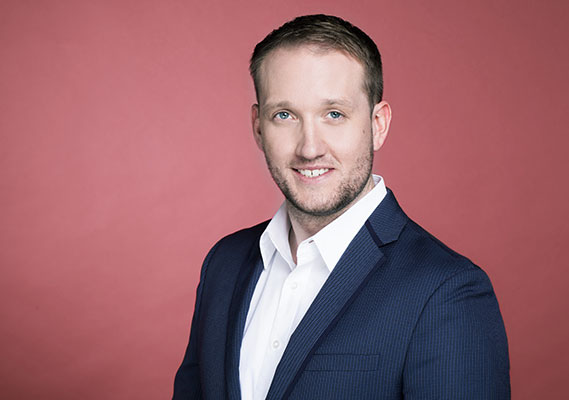
In the SAT.1 film Nackt. Das Netz vergisst nie., the photo on Lara’s phone gets onto the Internet even though she never sent it. How can smartphone users protect themselves against abuse?
Pascal Raddatz: Updating your operating system regularly is the key. These updates often close security gaps. Also, never react to spam, whether by e-mail, instant messaging, text or MMS – even the confirmation that the address is valid and the e-mail has been read, for example, is a valuable indication for attackers. Smartphones should be protected against physical attackers with a secure password, PIN, or fingerprint scanner. Care should also be taken with public WiFi networks, which hackers can use to attack smartphones by listening in on and manipulating communications.
What do people need to watch out for when they use apps?
Raddatz: Only install apps from the manufacturers’ official sites. Especially with free apps, often the real product is in fact the users’ data. The operating system uses access authorizations to manage the resources – such as texts, news, pictures, contacts, or current location – each app can access. As a general rule, when you install an app, always check the access authorization, compare it to the purpose of the app and, when in doubt, do not allow it. An app that saves your notes does not need to access your telephone contacts, texts, or camera.
Bullies often use fake identities. How can people protect themselves against that and check the sender’s identity?
Raddatz: You have to be aware that a lot of what’s on the Internet is fake. Always be cautious with information, never share it indiscriminately, and don’t make your profiles public. If you’re not sure, make an effort to identify the sender – for example, by calling them on the phone.
Do media companies run a higher risk of being preyed upon by hackers?
Raddatz: Attackers set their sights on various industries. We are aware of these threats and focus intensely – especially in the German election year – also on attack scenarios with political or activist motives. We collaborate with internal and external security experts, others in the media industry as well as the authorities to develop effective sets of measures. In addition to technical safeguards, in-house training is also vital.
Offensive comments also keep appearing on the stations’ social media fan pages. What happens when people ignore netiquette?
Raddatz: The Audience Relations Department is responsible for managing the communities on the free-to-air TV stations’ Facebook pages and some of their shows’ pages. Viewer comments are scanned attentively and discussions are moderated if necessary. If lines are crossed, countermeasures range from a friendly heads-up that a faux pas has been committed, all the way to blocking the user or – in clear cases of defamation – reporting the account on Facebook. Comments requiring legal action are rare, but may be forwarded to our legal counsel for review to see whether charges are warranted. With insults, however, charges need to be brought by the person affected. In such a case, a specific person or group of people must be clearly identifiable in the comment.
